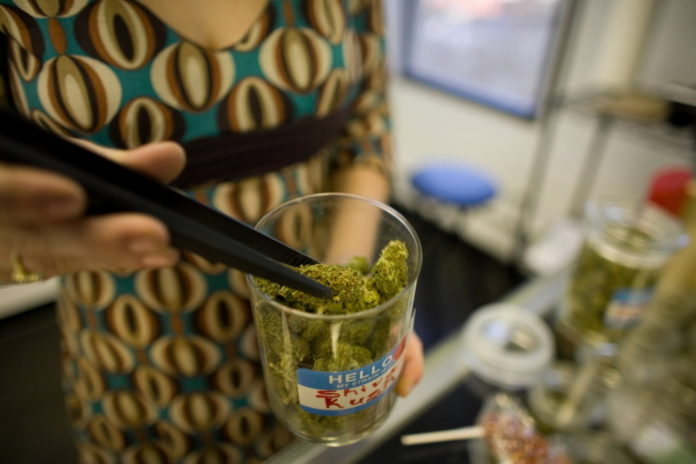Medical-marijuana dispensaries should be financially viable under the size limits passed by lawmakers last week, advocates of the centers say, even if the reduced scale will not meet demand for their services from patients.
“I think it will be workable,” said Seth Bock, the founder of the proposed Greenleaf Compassion Center in Middletown, one of three organizations selected last year by the state to open dispensaries.
“With the new parameters to have caregivers sell excess [marijuana] back to the compassion centers, even with that smaller number of plants, it should be enough to get off the ground,” Bock said. “We will take it from there.”
The new dispensary limits, amending the state’s medical-marijuana law in a bill passed by the House on May 16 (after clearing the Senate earlier in the month) were designed to shrink the compassion centers below a size that would attract the attention of federal law enforcement.
After state officials selected Greenleaf, the Thomas C. Slater Compassion Center in Providence and Summit Medical Compassion Center in Warwick, Gov. Lincoln D. Chafee refused to issue licenses for them when he received warnings from federal prosecutors.
Chafee and state lawmakers, including bill sponsors Sen. Rhoda Perry, D-Providence, and Rep. Scott Slater, D-Providence, developed the dispensary size limits as a way to appease concerns from the U.S. Justice Department, including U.S. Attorney Peter F. Neronha, about large, commercial-scale, marijuana retail centers.
The amended legislation bars any Rhode Island dispensaries from holding more than 99 mature marijuana plants at any time, or 150 plants total, including seedlings.
It also establishes new regulations for the dispensaries, such as requiring criminal background checks for employees of the centers and allowing the state police to visit the facilities and recommend security plans.
To avoid black market sales and bolster the dispensary supply chain, the bill allows individual caregivers, who fulfill patient prescriptions for medical marijuana now, to sell any excess they have to a licensed dispensary.
Even before the new size limits, most projections had been scaled back, even though medical-marijuana patient registrations in the state have grown this year to more than 4,400 patients.
Bock said under the new rules, his patient load would probably be approximately 300.
The long drive to open dispensaries in Rhode Island has been spurred by the challenges some chronically ill patients have experienced acquiring the drug in the current grow-your-own or find-a-caregiver setup.
JoAnne Lepannen, executive director of the Rhode Island Patient Advocacy Coalition, thinks the limits placed on dispensaries in the approved legislation are on the low side, but if they get the centers up and running it will be worth it.
“The patients have waited so long – if this is a system that can be refined as it goes along, that’s OK,” she said.
The proposed Rhode Island dispensary system is roughly similar to the medical-marijuana law in New Mexico, which initially limited growers to 95 plants each, but was raised to 150 plants after producers were unable to keep up with demand.
Lepannen said in addition to meeting demand, another concern was how long it might take to get the dispensaries up and running considering all the delays so far and the limited resources at the state Department of Public Health, which is charged with regulating the program.
Health department spokeswoman Dara Chadwick said in an email statement that it is not clear yet what kind of resource demands the new law will place on regulators, but health officials are committed to making the system work regardless.
While Bock has kept a space leased for the Greenleaf Center, it is less clear how ready the other groups are to open their dispensaries.
Attempts to reach representatives of the Slater Center and Summit Center were unsuccessful.
Bock estimated it could take four to five months to get his dispensary up and running. •
No posts to display
Sign in
Welcome! Log into your account
Forgot your password? Get help
Privacy Policy
Password recovery
Recover your password
A password will be e-mailed to you.













